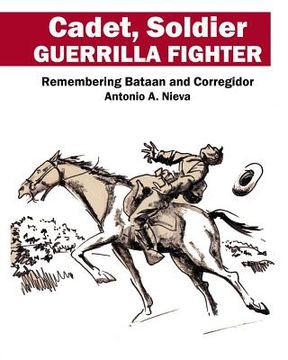Cadet, Soldier, Guerrilla Fighter: Remembering Bataan and Corregidor (in English)
Synopsis "Cadet, Soldier, Guerrilla Fighter: Remembering Bataan and Corregidor (in English)"
Antonio A. Nieva, a survivor of the Bataan Death March, remembers with fury and tenderness the battles fought by Filipino and American forces in the Philippines during World War II, from the time the USAFFE (United States Armed Forces in the Far East) recruited college boys from their ROTC units to the liberation of the Philippines by General Douglas MacArthur and his troops. Historical facts blend with personal vignettes, giving an intimate, moving, and sometimes humorous account of how the war affected soldiers and townfolk, housewives and society matrons, hustlers and gamblers, and the young and idealistic 20-year-olds who hied to the hills to fight a guerilla war against the Japanese. The Fall of Bataan was the largest defeat in history of the U.S. Army. Abandoned with only outmoded weapons and no supplies, the "Battling Bastards of Bataan" nevertheless held out for three months of fierce skirmishing, their victories delaying the Pacific advance of the Japanese Imperial forces. In the midst of the fighting, General MacArthur, Philippine Commonwealth President Manuel Quezon, and their families slipped away from Corregidor bound for Australia. America had decided to concentrate on the European war and it took three years for the General to fulfill his promise to return to the Philippines. "The last battle was not a battle. It was a rout," the author writes. "What is the death of an army like? There is no cohesive picture, just a series of disconnected rushes of a grade-B horror movie. Somewhere along a trail, Lt. Dima lay on his side, bent knees and arms enfolding his groin, crooning a death lullaby to himself: 'Patay na 'ko (I'm dead already, ' his last gasp between flickering life and recognition in the dimming eyes. By midnight the battalions had evaporated. In the Regimental Command Post, the Colonel to the assembled staff said: It's over. Save yourselves. Good luck." The author intersperses the horrors of the tortured, the dead, and dying during the Bataan Death March and the even more atrocious conditions at the POW Camp O'Donnell with stories of a failed escape attempt (not knowing what to do, the escapees returned to the March) and the procurement of chicken from a Japanese prison guard who didn't know the difference between five and ten peso bills. Malaria, dysentery, starvation, and war time cruelty killed more than 20,000 imprisoned Bataan soldiers. The Filipinos were released as part of Japan's strategy to unite Asians under a Greater Co-Prosperity Sphere free of western colonizers. They found Manila Japanized: Dewey Boulevard had become Heiwa, Taft Avenue Daitoa. Everyone had to learn Nippongo, and some of Manila's 400 collaborated with the new power. But did they? "Most of the double plays were so successful that soon the question became who was who?"' the author relates. Survival meant BSes (buyers and sellers and bullshitters), but still Manilenos managed to enjoy "everybody's parties" and "floating casinos" (floating from place to place). "Cadet, Soldier, Guerilla Fighter" also recalls how a future president, mistaken for a Japanese, narrowly eluded execution by friendly fire. In a future election that would cement martial law in the country, Ferdinand Marcos would face an opposition presidential candidate, Raul Manglapus, who, under the guise of a choir boy, planned a bloodless jailbreak from Muntinlupa prison with Fr. Jaime Neri and other guerilla fighters. As Captain Lancer with the Hunters-ROTC Guerillas, the author gives a first-hand account of the Los Banos Raid that freed nearly 2,000 American and Allied civilians as Japan's sun was descending into defeat. The Hunters, including its leaders Teddy Adevoso, Tabo Ingles, Frisco San Juan, and Tony Nieva, would remain colleagues in the fight for Filipino World War II veterans' rights, a battle that remains relevant to this day. This book is a celebration of the soul and spirit of the Philippines and its Bataan soldiers.

